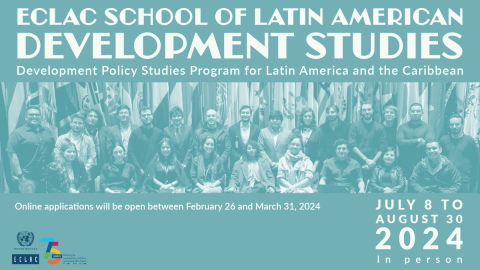Announcement
With over 110 editions published in Spanish and English (as well as special issues in French, Portuguese and Mandarin), the CEPAL Review constantly receives submissions from researchers in Latin America and the Caribbean and elsewhere analysing the many challenges currently facing the region and the suitable policies for tackling them.
More than 1,000 free-access articles have been published throughout its 37 years and these attest to its focused vision of development that covers not only the economic dimension but also considers social, education, gender, environment and all topics that make up the integral development of the different Latin American and Caribbean countries.
The review is editorially independent and the main academic publication of the Economic Commission for Latin America and the Caribbean - although it is not the official voice of ECLAC. Its purpose is to provide a space for academically renowned authors from various spheres to encourage dialogue and disseminate new knowledge from the universities and think tanks of the region and beyond.
While the content is not editorially reviewed by ECLAC, the articles are along the lines of reflection in which this regional commission of the United Nations has been engaged throughout its history.
CEPAL Review was founded in 1976 and the first Director, Raúl Prebisch (Executive Secretary of the Commission between 1950 and 1963), focused the analysis in those first years on growth strategies, their links with the production structure, patterns of distribution and power structures.
Between 1987 and 1995, the CEPAL Review was directed by Chilean economist Aníbal Pinto. Its articles emphasized ECLAC's proposal for productive transformation with equity and the neostructuralist approach. The following period (1996-2008), under Oscar Altimir, saw the publication of studies incorporating analytical tools (econometric analyses, computable general equilibrium models, more refined sectoral analyses and so forth), which enabled the publication to be incorporated into the Social Sciences Citation Index (SSCI) published by Thomson ISI from December 2007 onwards.
This major advance resulted in improvements to the quality of published material, while also seeking to strike the right balance between economic and sociopolitical issues, the development vision and the long term and strengthening the editorial line of the publication, based on unfettered academic and intellectual independence.
Since 2009, the editorial team of the CEPAL Review had been led by Osvaldo Sunkel as Chair of the Editorial Board, André Hofman as Director and Miguel Torres as Technical Editor.
In recent times, the publication has broadened its editorial line to reflect the changing scenarios of modern reality, which is characterized by a series of socioeconomic, institutional, political, environmental, cultural and conceptual transformations that signal a change of era.
A long list of public figures have featured in the pages of the review throughout its history, including Celso Furtado, Fernando Henrique Cardoso, Víctor Urquidi, María Conceição Tavares, Osvaldo Sunkel, David Ibarra, Fernando Fajnzylber, Carlota Pérez, Gert Rosenthal, José Antonio Ocampo, Nobel Prize Winner for Economics - Joseph Stiglitz, Dani Rodrick, Manuel Agosin, Ricardo Ffrench-Davis, Adolfo Figueroa and Aldo Ferrer - to name but a few.
CEPAL Review can be downloaded free of charge from ECLAC's website and has an application for mobile devices (app).



